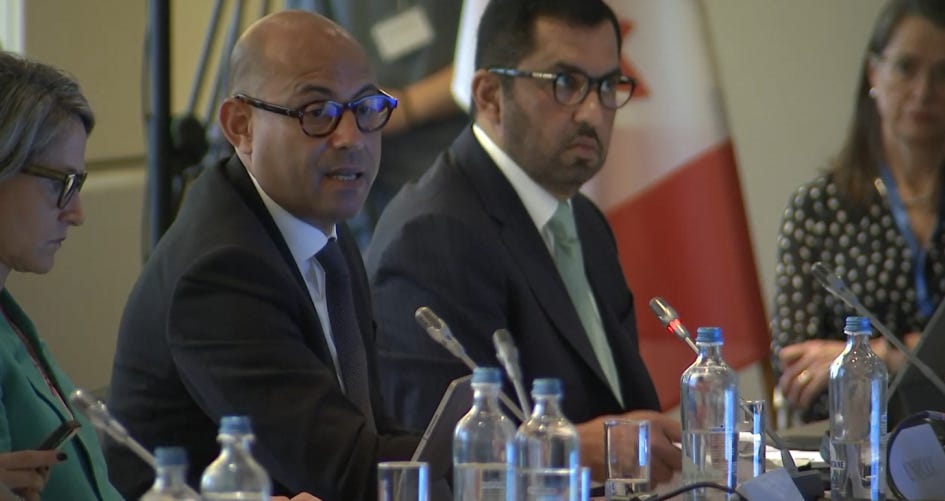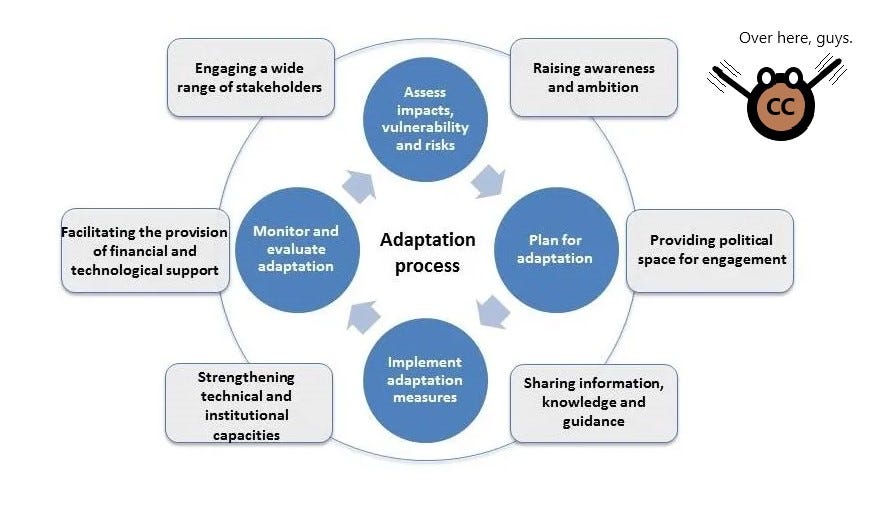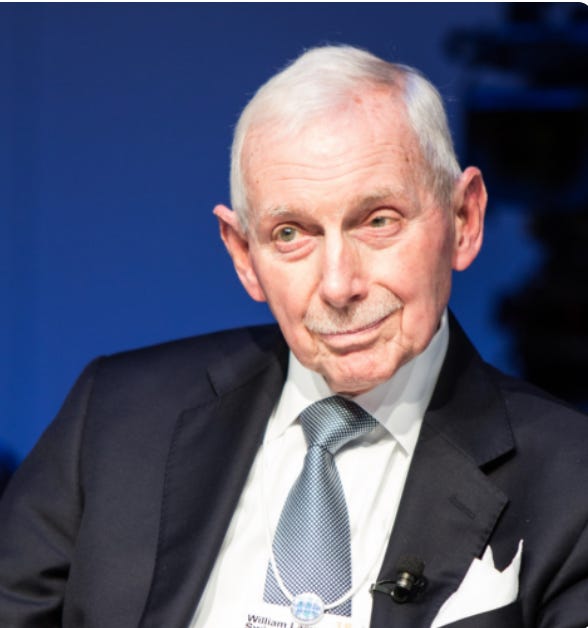Change Climate Change Climate
How the political response to climate change has neutered the fight against climate change, and is only making it worse. Plus turning us into proles.
Everyone has their own mental algorithm they use to help them stake out their viewpoints. For some, they are very simple. What kind of music do I like? Whatever my friends like. For others, they are very complex.
My own algorithm tends toward the simple: a) the more unified the media are on any given topic, the more well-advised I am to do my own research, b) the credibility of a viewpoint is inversely proportional to the number of celebrities who publicly express it, and c) any post on r/politics that garners more than ten thousand upvotes is guaranteed to be completely inaccurate, utterly ridiculous, or both. My algorithm gives man-made climate change a “0” on a scale of 1 to 100.
But, then there is data like this from the NOAA's National Centers for Environmental Information: “The five warmest years on record [since 1895 for the US] have all occurred since 2012.”1 I didn’t even try to work out the odds of that happening by random chance, but I’m assuming it’s a tiny fraction of a percent. So, assuming the stat is accurate, it sounds like something serious is going on with the climate. Moreover, the explanation of the mechanics of the actual physical process of anthropogenic climate change makes sense, at least to my non-expert eyes.
So, I was split in my view. I couldn’t reconcile the physical phenomenon of climate change with the political phenomenon of climate change.
Just over 30 years ago, the world responded to growing concerns over climate change with the ratification of an international treaty called the United Nations Framework Convention on Climate Change (UNFCCC). A couple of decades later, in 2015, with little to show for itself and public concern higher than ever, the UNFCCC produced another treaty called the Paris Climate Agreement, which it describes on its website as “a landmark in the multilateral climate change process because, for the first time, a binding agreement brings all nations together to combat climate change and adapt to its effects.”
Combat climate change and adapt to its effects? Aren’t those goals a little, I don’t know, cross-purposed? It’s like setting a goal to lose weight and then going out and buying some plus size stretchy pants so you’ll be comfortable when you gain weight.

To get an idea of the caliber of our planet’s fight against global warming, here are the first few paragraphs of UN Executive Secretary on Climate Change Simon Stiell’s July 13 keynote speech in Brussels, “We Need to Build a Collective Understanding Halfway to COP28:”
We are now halfway through the year to COP 28.
COP, which stands for Consolidating Our Power, is their big annual meeting.
I’m pleased that many of us have seen each other quite a few times at various events this year.
I’m pleased that many of us have been to quite a few meetings this year.
When preparing for this, I was thinking about the progress of this year. I was wondering what it is that we have collectively building towards, each time we meet.
So, when thinking about this year’s string of meetings I suddenly wondered what the heck have we been meeting about each time we meet.
The resounding feeling I had was the possibility of building a collective understanding, which can be duly tested with those colleagues not present, and provide us with the opportunity to make considerable progress in Dubai.
Frankly, I really don’t know what those meetings were about, but I’m convinced that it is possible at this meeting for all of us to understand something. Later, we can meet with colleagues who aren’t at this meeting to “test” this understanding and then our understanding can provide us with the opportunity to make considerable progress at an extravagant tourist city located in the country with the sixth highest carbon emissions per capita in the world, to which we are all going to fly on big jet airplanes.
The Global public is looking at us around this table now and they will look again in a few months’ time. People are looking for the signal that we understand the urgency of the crisis and are collectively rising to the occasion.
“Global public” (shudder) since when is “global” capitalized? Is “globe” a proper noun, now, like “America” or “Europe?” And just notice the mushiness of the language—the sheer meaninglessness of it.
I am supposed to list all the progress we have made thus far, but I won’t because you were there.
It vacuously goes on like that. But, as far as I can tell, this is what the UNFCCC primarily does. They meet.
(Above from Monty Python’s Life of Brian)
While Stiell doesn’t list all the progress they have made thus far, the UNFCCC website does. Under the heading, “What Have We Achieved So Far?” they sum it all up:
Although climate change action needs to be massively increased to achieve the goals of the Paris Agreement, the years since its entry into force have already sparked low-carbon solutions and new markets. More and more countries, regions, cities and companies are establishing carbon neutrality targets. Zero-carbon solutions are becoming competitive across economic sectors representing 25% of emissions. This trend is most noticeable in the power and transport sectors and has created many new business opportunities for early movers.
I hope to do a subsequent post on the whole “zero-carbon solutions” thing, where developed nations (US) purchase “carbon offsets” from less developed nations (China, Zimbabwe), who set their own carbon emissions caps, and what a giant swindle it is and what an embarrassing example of the golly gee-whiz stupidity of white people.
By 2030, zero-carbon solutions could be competitive in sectors representing over 70% of global emissions.
In other words, except for those “zero carbon solutions” they’ve achieved in the future, they’ve achieved zip so far. I spent hours on their website and came across one item where someone was actually outside in the climate somewhere planting trees. One. Incidentally, the US share of the “massive increase” in “climate change action” the UNFCCC wants this year is a hundred billion dollars.
“The Paris Agreement reaffirms that developed countries should take the lead in providing financial assistance to countries that are less endowed and more vulnerable…,” says the organization that has accomplished nothing in 30 years, “Climate finance is needed for mitigation, because large-scale investments are required to significantly reduce emissions…”
I think we could probably significantly reduce emissions by not sending the UNFCCC large-scale investments. Make them all stay home and have their meetings on Zoom.
The adaptation stuff, however, does looks like it costs a lot of money.
From the “Introduction:”
Adaptation…can range from building flood defenses, setting up early warning systems for cyclones, switching to drought-resistant crops, to redesigning communication systems, business operations and government policies.
So, this useless climate change organization uses our money to fix poor countries. We just can never learn to leave everybody else alone, can we? We are already the most hated people on the planet, but hey, let’s go in and “redesign” their governments’ policies for them.
And even if flood defenses are a good thing, why is it up to the UN to build them? And why is it up to us to pay for it? Our own infrastructure is so bad that America’s homeless are hard pressed to find a bridge safe enough to sleep under. That should be our first priority. Moreover, none of these “adaptation actions” in any way alleviates actual climate change. In fact, speaking strictly from a scientific point of view, to the extent your flood defenses save human lives, you are exacerbating climate change.

But, as we shall see, the adaptation part of the fight against climate change isn’t only about redesigning poor countries and building them a levee. There is something even more sinister afoot. To see clearly what that is we first have to understand something about the term “climate change” itself. “Climate change” seems to have become something like the term “wreckers” was in the Soviet Union—a flexible term describing something non-specific but almost supernaturally powerful on which just about anything can be blamed. Consider this bit by Aaron O’Neill at Stastica in which climate change is so powerful, it causes itself.
By 2100, the world's population will have three billion more than today, with the vast majority of this concentrated in Africa. Demographers predict that climate change is exacerbating many of the challenges that currently hinder progress in Africa, such as political and food instability; if Africa's transition is prolonged then it may result in further population growth that would place a strain on the regions resources, however, curbing this growth earlier would alleviate some of the pressure created by climate change.
It also causes African women to have double the replacement level number of children. It causes political instability. Maybe it was climate change that caused over 4,000 ballots in Fulton County, Georgia, to have precisely the same timestamp even though it takes at least one second to scan each ballot.
In other words, in the political climate surrounding the fight against political “climate change,” we’re really not fighting physical climate change at all. We’re in the world of the ideologues fighting imaginary enemies like white supremacy in whatever way the politburo orders us to; we’re dupes enlisted in the service of the Internationale—the proles in the dictatorship of the Global proletariat. Once I understood that the people to whom we’ve entrusted the fight against climate change have as much concern for global warming as the Soviet politburo had for universal equality, my split mind on climate change was reconciled and my own personal algorithm was rehabilitated.
A few years back, on a hunch, I fired up the spreadsheet and entered data on the per capita carbon footprint by country, which I then compared to the latitude of the population center for each country. And, just as one might expect, in general, the farther you move away from the equator, the greater your “carbon footprint” becomes.2
World migration patterns show a massive transfer of population away from the equator—out of low carbon emitting countries and into high carbon emitting countries. If the UNFCCC were a serious, responsible organization actually dedicated to fighting climate change, the government policies they would be attempting to redesign would be ours. They would be lobbying Congress to end the immigration epoch tomorrow, which would accomplish more in one day to alleviate climate change than the UNFCCC has accomplished in 30 years.
But here’s what we got instead from the UNFCCC:
On the occasion of the 26th United Nations Framework Convention on Climate Change Conference of the Parties (COP26), the UN Network on Migration urges States to strengthen their commitments and address the reality that people increasingly migrate to adapt to the adverse effects of climate change…
Taking ambitious and urgent climate change mitigation and adaptation action and facilitating safe, orderly and regular migration of people affected by climate change, including by enhancing the availability and accessibility of regular migration pathways and ensuring decent work for migrant workers, will be critical. This would help prevent affected people from resorting to precarious or irregular migration, including at the hands of smugglers, while providing greater certainty and predictability for all communities.
Furthermore, community-led inclusive climate adaptation and mitigation measures, enabled by adequate climate finance, will allow affected communities to develop resilience and just transition to a well-being economy and increase the chances that people migrate out of choice, not necessity.
In other words, the money you are paying to fight climate change will be used to move people away from the equator and into your country, thus exacerbating climate, which is causing people to move to your country in the first place.
To this end, the Network calls on States to integrate human mobility scenarios in their climate change policies, plans and actions.
The word “network” is one of those words that even sound evil as proper nouns.
Key to this will be recognising that the Paris Agreement, the Global Compact for Safe, Orderly and Regular Migration (GCM), the Sendai Framework for Disaster Risk Reduction 2015- 2030 and the 2030 Agenda for Sustainable Development are interlinked and provide a mutually reinforcing framework that should be implemented simultaneously.
The first time the GCM came up for consideration the only nations that didn’t sign it, as I recall, were the United States, Israel, Poland, Hungary, and the Czech Republic, with Israel’s Bejamin Netanyahu saying that Israel had the duty to protect its own borders. But what’s with the US vote? Protecting our own borders just isn’t who we are. Oh, wait. That vote was in 2018. Now, of course, we’re fully on board
The Network reminds States that any policy measure or legislation that governs or directly affects migration in the context of climate change should remain consistent with their human and labour rights obligations.
So, just as everything in the Soviet Union could be put in the context of an ephemeral class struggle, which justified anything, including the mass murder of millions of innocent Russian Christians, everything today can be put in the context of climate change. Thus a nation’s right to determine its own immigration policy has been taken away from you and given to your friends at the Network. Mass immigration will continue because diversity is their strength.3

If physical climate change really is the looming cataclysm we are told it is, then we need to gain control of the fight against it and oust those who have hijacked the fight for their own nefarious ends. A good start would be, instead of giving the Network $100 billion to redesign poor countries while holding meetings at expensive hotels in exotic locations, give the money to immigration enforcement so they can help the 18.5 million4 foreigners here illegally return to their homes nearer the equator. And build the wall.
“2020 was the United States' fifth-warmest year on record,” Rebecca Lindsey, January 13, 2021
The Gulf Oil States are the exception; their per capita carbon footprints are the highest in the world.
Does anyone remember what the very first announcement was out of the White House after the Biden Administraton took control in January, 2021? They announced, as a triumphant fuck you, the border is literally open.
When I started ProjectUSA in 1998, the number of illegal aliens in the United States routinely reported by the New York Times was 12 million. That was 25 years ago. Though the number of illegal border-crossers and visa overstays per year is probably far higher (we don’t even know how many people overstay their visas, if you can believe that), let’s assume it is 250,000, which puts us at 18,250,000 today. As far as I know, the New York Times has never stopped reporting the 12 million number. Odd, no? Moreover, the illegal population has a higher birth rate than the native born. Immigration has a huge impact on US population growth, especially when you take into account the million or more legal immigrants per year allowed by our destructive immigration policy.

Comments
Post a Comment